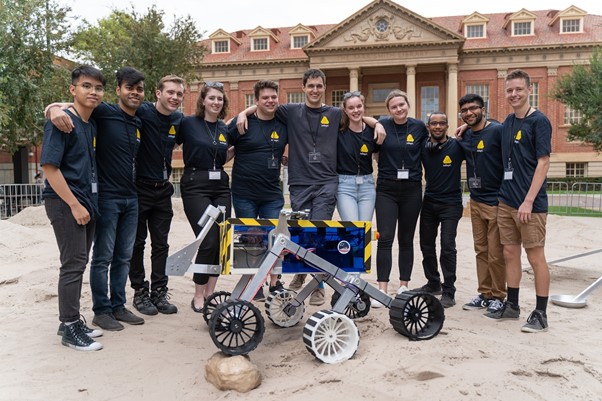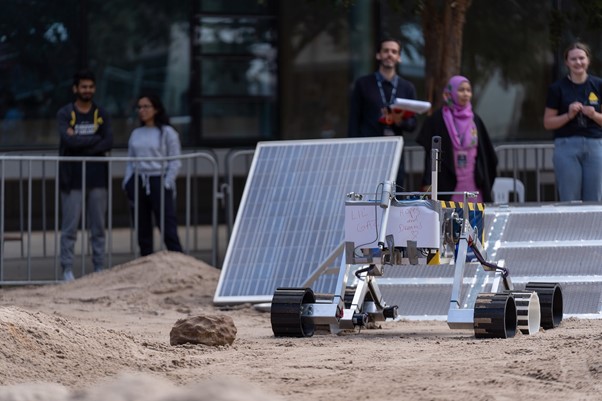In March, I participated in the inaugural Australian Rover Challenge as a member of the Adelaide University team. The challenge tasked university teams to design and build a fully functioning rover to complete a series of tasks within a simulated lunar environment. Some of the tasks included: constructing walls with a robotic arm, collecting water samples, and driving autonomously. Alongside being an opportunity to develop a really cool robot, this competition enabled the engagement between university students and Australia’s new space sector. Hearing about this project opportunity, the space nerd inside me knew it was something I just HAD to be involved in.
Starting the project in September 2020, we had seven months to design and build a rover from the ground up. Seven months seemed like a long time, but very quickly we realised it wasn’t long enough. I was a member of the mechanical design team, and was involved in all sorts of tasks, such as: choosing motors, CAD, and designing the physical systems of our rover. Now, I’ve never built a rover before, and neither had anyone else, so this design process was a fantastic opportunity to learn new knowledge and skills in a safe, collaborative, and judgement-free environment. As the deadline of March 2021 drew closer, I spent many weekends and evenings trying to get our beast of a rover, aptly named ‘Lil Gaz’, up and running.

The competition was held over three days in March, and I think stands as one of the best experiences I’ve had at university thus far! Teams from Monash University, RMIT, and Melbourne University made the trek across the border with their rovers to compete. As we got into our workshop tent to add the final touches, naturally, everything that could go wrong did. While we scrambled to figure out why our communications system didn’t work properly, we were called out onto the track… it was go time. Continuing with repairs on the competition track, we managed to fix the issues with less than 10 minutes remaining for our run. I will never forget the feeling of standing back, and watching Lil Gaz descend upon the ‘moon’s surface’ for the first time (I definitely cried a little). Seeing the other teams compete was also a fantastic experience, as their hard work and creativity was really inspiring.

Overall, we placed third in the competition, and took home the “Best Newcomer Team < 1 Year Old” award. I was also very honoured to be chosen by our Project Leads to receive the “Most Valuable Team Member” award – something that belonged to any of the wonderful and hardworking people on the team.

One of the best experiences in this competition was to work with and learn from all of the participants. I had the opportunity to speak with members from all the different universities, and it was truly humbling to share stories of our successes and failures. While we shared tips and tricks, we began talking about future collaborations between the different teams. And to me, that’s what’s really at the heart of a project like this – a bunch of enthusiastic students working together on something that they love, with no reward other than to learn something new and work with other like-minded students.
About Abigail: Abigail is in her second year of a Bachelor of Computer Science (Artificial Intelligence). When not building rovers or dreaming about space, she spends time playing her piano to an attentive audience of house plants.